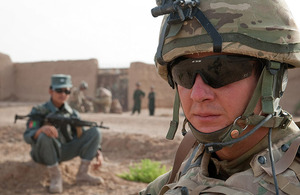Operation LION'S GAP helps villagers intimidated by insurgents
British and Afghan soldiers recently deployed on an operation to the south of Nad 'Ali after they heard that local villagers were being terrorised by insurgents.

Soldiers of the Queen's Royal Lancers work closely with the Afghan National Police and Afghan National Civil Order Police during Operation ZAMARAY CHASM [Picture: Corporal Gary Kendall, Crown Copyright/MOD 2010]
Operation ZAMARAY CHASM, which means ‘Lion’s Gap’, was carried out to reassure the local people and to search a compound previously used as a firing point by the insurgents.
The operation was co-ordinated with other ISAF troops and the Afghan security forces.
The soldiers of C Squadron of the Royal Dragoon Guards and Corunna Company of 1st Battalion The Duke of Lancaster’s Regiment pushed south into the village, or kalay, as Fondouk Squadron from the Queen’s Royal Lancers pushed west. Apache helicopters and fast jets were in support.
This was a joint operation from beginning to end - jointly planned, co-ordinated and carried out with the Afghan National Civil Order Police (ANCOP). This was the first operation for the ANCOP, recently arrived in Helmand from Kabul.
Key throughout the planning stages was the discussion of how to avoid civilian casualties. Colonel Hakkim, Commander of the ANCOP, made clear where the responsibility lay:
Bullets can’t tell the difference between insurgents and children, but you can, and you pull the trigger.
Fondouk Squadron moved in before dawn, with 2nd Troop and their partners clearing the route in and checking for improvised explosive devices.
3rd Troop, under Lieutenant Giles Rolls, then moved in, mounted in their Scimitars, to provide armoured vehicle support. To the north, 1st Troop was on the ground, providing protection.
Conscious of working within the boundaries of the Afghan culture, Lieutenant Ed Jones and Trooper Ian Baird, from 2nd Troop, went to the house of the village elder to ask his permission for the ANCOP to search the compound.
The search was peaceful but led to villagers admitting that they had been made to feed and house insurgents who took over the compound by force in order to fire at ISAF troops.
Lieutenant Jones said:
We took the time to show how little respect the insurgents have for them and to encourage them to tell us if the insurgents return.
Everywhere we went, we took the opportunity to hold ‘mini-shuras’ with the villagers, squatting by the corner of a compound with five to ten people and talking through their problems.
We stressed how little the insurgents offer them and the ways in which they can find the courage to stand against them.
The response from the people was overwhelmingly positive, with gradual steps being made towards winning their support.
Adrenaline was high and everyone was alert as intelligence received earlier in the day had suggested that insurgents had seen the ANCOP and ISAF vehicles and were preparing to attack from all directions.
Then, as Fondouk Squadron withdrew from the muddy local fields, empty after the harvest, one vehicle lost its tracks - forced off by the cloying mud.
Major Jim Walker, Officer Commanding Fondouk Squadron, said:
The insurgents saw their opportunity and fired at the crew as we attempted to rectify the problem, mindless of the women and children close by. If the villagers needed any clearer indication of how little the insurgents care for their well-being, this was it.
Fondouk Squadron instinctively moved forward to protect the villagers and recover the stricken vehicle.
Squadron Sergeant Major Tony Gould pushed forward in a recovery vehicle, accompanied by the squadron medic, Lance Corporal Cheryl Fray.
The medic checked that the villagers hadn’t suffered any injuries while Sergeant Major Gould assessed the situation and got the Scimitar back on the road.
Meanwhile, the remaining Scimitars of 3rd Troop moved forward to protect and secure the area:
It was lively for a while, but the shooting soon stopped as the vehicles came forward. Luckily, there were no injuries to the local people,” said Lance Corporal Fray.
The insurgents had by this time dropped their weapons and hidden among groups of women and children in the compounds to the west.
With the vehicle repaired and the villagers protected in their compounds, the squadron moved back once more. But the danger had not passed. Again the insurgents tried to engage, aiming small arms fire at 1st Troop.
Lieutenant Jonny Clayton, supported by his Troop Sergeant Dave Chappell, moved towards the insurgents to deter them from further attacks. It was this willingness to advance towards them that surprised and wrong-footed them, with the shots soon dropping away.
Lieutenant Clayton said:
We saw them lower their weapons and retreat into compounds using children as their shields. We will not fire on them in that situation. Protecting the people is always at the front of our minds. But we moved closer so we could identify the compounds they were hiding in.
Content that they had learned much from the villagers and shown strength against the insurgents, the squadron moved back through the village.
Major Walker said:
This operation was an overwhelming success. It was our first joint operation with the ANCOP. We planned it together and carried it out together. Not only that, we were able to show the people there is an alternative to the insurgents’ intimidation of the weak, the young and the elderly.
I hope they now understand that they have the power. The insurgents are afraid of the people, because united, they have the power to reject them.